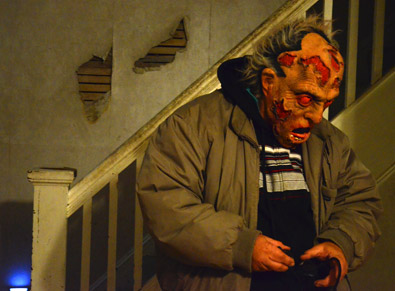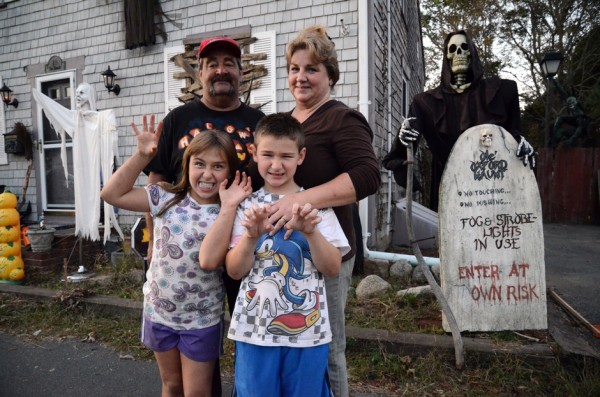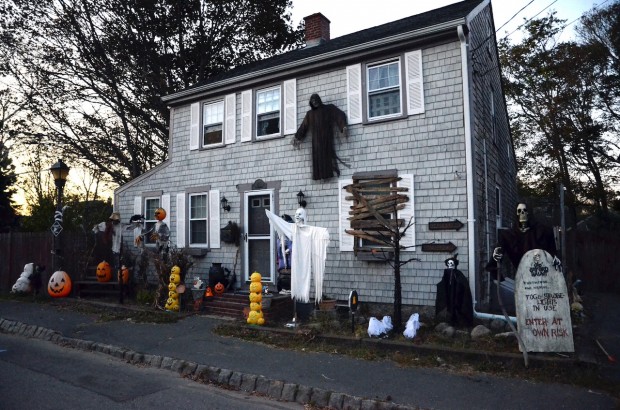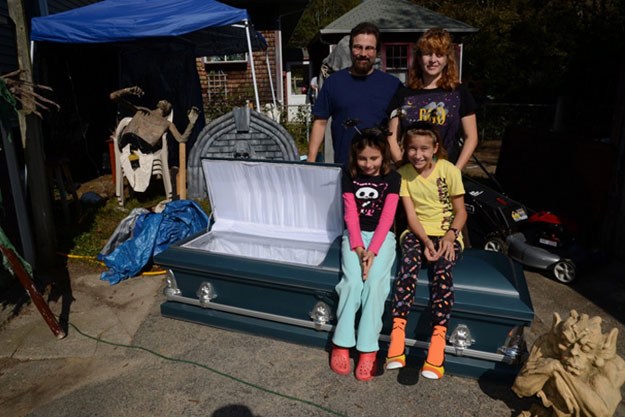
The American Scream is a pure joy to behold. Halloween is definitely one of my favorite holidays, so I come in with bias, yet everything director Michael Stephenson (Best Worst Movie) has accomplished is transfixing in various ways. The home haunt subculture it explores is wild with creative glee, while the familial frustrations of being in a stressful situation are relatable and yet all their own fault. Then there is Victor Bariteau, the subject of the documentary whose passion for Halloween even has the cliched backstory to go with it, yet you fall for him and his family regardless.
So, it was a pleasure to sit down with Stephenson, Bariteau, and producer Zack Carlson last month to discuss how Victor was lucky number 13, how Stephenson molded the heart of the film, whether Victor’s sense of community is pulling him away from his own dream project, and why he doesn’t want people to see things simply purchased from the store in his home haunt. Check out the interview below.
The Film Stage: So, you’re here for a few days in Austin. You’re here for business. But do you say, “Hey, I’ve heard about Austin, this is what I want to do.”
Victor Bariteau: Well, first, I was actually shocked by what Austin is really like. There’s a lot of culture here. Lot of music. I love music. Live music is just the best. So I was honestly expecting cowboys and ranches. I’ve never been to Texas before. But Austin is the combination of Columbus, Ohio and LA kind of mashed up into one. You just go out onto the street and have the best food. Even New Orleans. It feels like that. The entertainment and the culture. Everything. I was really shocked and pleasantly surprised.
 The funny thing is that you’re mentioning that and you’ve only been here for a couple of days. It kind of hits you upside the head as soon as you come in. It’s incredible the atmosphere they have going on.
The funny thing is that you’re mentioning that and you’ve only been here for a couple of days. It kind of hits you upside the head as soon as you come in. It’s incredible the atmosphere they have going on.
Bariteau: Yeah, I wouldn’t have originally thought of this as a vacation spot. But absolutely. You could come here and have a blast for a week. It’s something different every night.
The film is largely based on people creating their own home haunts. There’s a certain amount of innovation that goes on. There’s this one key moment where you’re [Bariteau] walking around this Halloween superstore. It’s almost as if you’re looking at things for ideas but you’re not looking at things as in, “I want to buy that” because, what? In your head you’re thinking, “I can do that better”?
Bariteau: Well, when you go to these things, they’ve actually borrowed a lot from home haunters in what they’ve done. I’ve seen replicas of what people have done. And then they have to scale it down so it’s affordable, which is great, but when I’m looking at this tombstone [inside the room is an obviously fake-looking tombstone], and it looks fake to me. My tombstones look like tombstones in an actual graveyard. I don’t want people to come to my haunt and see what’s in the stores. So if I do buy something from a store, I need to modify it. I need to change it; improve it, so people feel like they’ve got a unique experience not just another display.
There’s a certain level of heart in the film. It really comes to play in the end. Is that a natural progression where you’re trying to hold back on getting the audience fully invested in these characters and get the tears rolling or is it easy because you have a natural lead-up to where stress and things like that are eventually going to break out?
Michael Stephenson: I think, for me, getting people invested in the characters first and on board is far more superior than content or anything they’re doing. You really want to identify with these people. I think that one of the biggest ways of identifying with anybody is not only seeing their strengths, but seeing their vulnerabilities. All of us have flaws, so in many ways this is [Victor’s] story. In my mind, he’s in many ways the protagonist and the hero. But, like all of us, he has his weaknesses. I think that’s critical in finding that to be able to latch onto characters. Manny has his strengths and things that right off the bat, you identify with, even though it’s not speaking to necessarily the subject matter, it’s speaking to who they are individually.
So getting people on board with the characters is critical. And I’m a huge fan of character docs as opposed to textbook commentary docs on defining one thing or another. I like characters to lead films. I like very little exposition, voice over, or any sort of spoon-fed information. I’d like you to just feel like you know these people. In terms of progression, for the film and getting everybody on board, this always felt very slow and slow and building and building until Halloween is that big, emotional moment. As opposed to an up and down, this was slow and steady. For one reason or another it worked out. It feels like we’re building towards something big. The stakes subtly increase as we move towards that.

You were mentioning that you like doing character stories and not just documentaries on things or ideas. So did you go through quite a few meetings with people and different home haunters before you landed on Manny and Victor?
Stephenson: Yeah, we did. We cast a wide net first in an effort to get our film on the pulse of the subculture and what was happening. It was a national outreach initiative. We asked home haunters to submit a questionnaire. And the questionnaire wasn’t just about Halloween. It was also written in a way to give us unique insights as to who they were in hoping that things would jump off the page. Passion and the genuine nature and spirit of why people do this was quickly apparent just from the written submissions. We then tried to reduce that to our top 12 list. I had always imagined two to three or one to three [people]… really focusing on a smaller lens, so to speak. Keeping it small. Once we had our list it was really important for me from that point to not just learn about their haunts, but I wanted to have lunch with them or I wanted to hang out with them. I wanted to meet their kids. Just get a glimpse into their personal lives. Again, that was at the center of what I was interested in most. Haunting and Halloween was a beautiful and awesome wallpaper to a story that I thought was more identifiable to all of us.

One of the haunters in the film mentions the most pleasing thing about Halloween for them is the community aspect. That it brings people that do not necessarily know each other together. Maybe they’re neighbors but don’t talk to each other. Except they’ll come by on Halloween to see what you have. On that note, the film obviously ends in a certain direction. Do you feel odd being pulled by your sense of community and still having your business?
Bariteau: Yes. The business is my dream. It’s what I’ve always wanted to do but it’s heartbreaking that I won’t be doing the home haunt anymore. I don’t have the bandwidth to handle both. Friday night I was at the haunt til 3AM flame-proofing walls and I got home about 3:30. At 4AM, my family was waking up to catch the plane. So I literally had two hours of sleep on the plane. There’s no way I could survive a pro haunt and a home haunt. So it’s a little sad that I can’t do the home haunt. And I know my neighbors are going to be upset with me. A few years back I worked at Spooky World to learn from them and I didn’t do the home haunt and I thought there was going to be a lynching in my neighborhood. Everybody was like, “What’s going on?” Thankfully I think Manny is at that point now where he can handle to whole neighborhood himself. So I’m just going to put up a sign saying, “Go See Manny” and maybe that’ll take a little bit of pressure off me. [Laughs]
So, were you familiar with Best Worst Movie when he approached you?
Bariteau: Actually, I wasn’t. I think I’ve seen Troll, the original one, when I was younger.
But not the best worst movie…
Stephenson: [Laughs]
Bariteau: No, no. Not best worst movie. Where we are, there’s not a big movie culture. There’s no music culture. We’re really lacking in a lot of the arts where we are. Maybe that’s why this is such a big thing to me. I’m not sure. But I didn’t learn about all of that stuff until Mike was on location for a little while. Then we checked it out on Netflix, and we were like, “Oh, OK. Cool. That’s what it’s about.” So, yea, I was not aware of that. I wasn’t even aware that he was in a movie until he had been in the house for a couple of weeks. I find it surprising. But my kids were the ones telling me about it: “Oh, check this out dad!”
Stephenson and Producer Zack Carlson: [Laughs]
 It’s interesting having the filmmaker and the star in one room because he was talking about he basically had a questionnaire. I’m curious to get your reaction and your mentality. Did you have the idea that “If I fill out this questionnaire, I’m going to be in this movie”?
It’s interesting having the filmmaker and the star in one room because he was talking about he basically had a questionnaire. I’m curious to get your reaction and your mentality. Did you have the idea that “If I fill out this questionnaire, I’m going to be in this movie”?
Bariteau: No, no. I was encouraged. I heard it on HauntCast—a podcast for home haunters—and I didn’t apply. Then Carol, a friend from New Hampshire that does this as well, told me I really had to apply. So I said OK. I did it half-heartedly. I used an old YouTube clip from my haunt as a link. I honestly didn’t expect to hear back because there were so, so many home haunts out there. Then I got an email from Zach saying, “Sorry to say this, but we’re going to come down and interview you.”
[Everyone laughs]
Bariteau: Even at that point I was like, “Oh, cool, they’re coming. That’s cool.” I knew so many other people, even from New Jersey, that they were interviewing. I had met them online and conventions. I was just thinking, “Obviously we made the finals, so I’m pretty proud of that.” But there’s no guarantee that they’re going to come to my house. I will say that when they left after the interview, I did get sort of cocky and I told John, because John was there: “They’re coming back.” And it wasn’t because they were looking at me. It was because they were looking at everything. They were very charmed by the town and I think John, in my opinion, sold it to you guys. Talking about how it’s very different here than where he’s lived in the past.
Stephenson: It was interesting, too, because we almost… If it would have been just the questionnaire, we wouldn’t have gone to Care Haven. We had all of our submissions categorized: green, yellow, and red. We had found our top 12. They were all green. At that point we had two steps. We had a written submission and then I called and talked to each of them. With Victor, he was red at that point. I hadn’t called him. Nothing jumped off the page [during the submission process]. A couple days before we left, I was browsing through other things. I was doing some last minute checks to make sure we were covering everything. I can across this photo of Catherine, Victor’s daughter, standing next to this giant spider with this huge smile on her face. I just sat in front of the computer and was taken by it. While I was on the phone with Zach, we were looking at our Google Map route. “Well, he’s not that far away from a guy up in Cape Cod. It’s kind of on our way. Let’s do it.” So he ended up being our top 13th. At that point we were kind of nerds, too. “That’s a sign!”
[Everyone laughs]
Stephenson: So we had to do it. And of course, it’s the one. It’s the one that led us to the others, too. Manny and the Brodeurs. They weren’t part of that submission process.
The American Scream has limited showings through November and can be requested in your town via Tugg.

